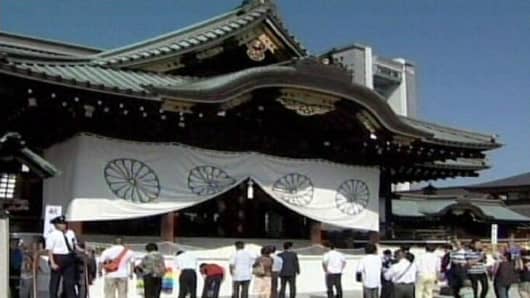Japan marked the anniversary of its surrender in World War Two on Friday, but Prime Minister Yasuo Fukuda was expected to avoid visiting a shrine for war dead seen by Asian neighbours as a symbol of Tokyo's past militarism.
Tokyo's Yasukuni Shrine honours Japanese World War Two leaders convicted as war criminals by an Allied tribunal, along with 2.5 million war dead. Past visits there by Japanese leaders have divided opinion at home and angered countries that suffered under Japan's military aggression in the early 20th century.
Fukuda, 72, made clear when he took office last September that he would not visit Yasukuni, although at least one of his cabinet ministers was expected to be among conservative lawmakers who make a pilgrimage to the shrine.
Sino-Japanese relations foundered during the 2001-2006 tenure of Prime Minister Junichiro Koizumi, whose annual visits to the Shinto shrine outraged Beijing. A thaw began after his successor Shinzo Abe stayed away during his short-lived term.
Fukuda, a moderate conservative who stresses good ties with Asian countries,was to pay his respects at a secular memorial to Japan's unknown soldiers and attend a government-sponsored remembrance ceremony along with Emperor Akihito.
Debate over visits to Yasukuni has been muted ahead of this year's anniversary, as policy-makers and voters focus more on Japan's faltering economy and consumers' worries about rising prices than questions of national pride and wartime history.
"I think public opinion is more concerned with economic issues. The economy isn't very good and there are worries about social inequalities," said a 48-year-old advertising agency employee walking through Yasukuni's grounds this week.
But proponents of pilgrimages to the shrine still resent Beijing's past public criticism of leaders' Yasukuni visits.
"The prime minister should come here," said Masahiro Yoshioka, who paid his respects at the shrine this week.
"The Japan of today is the result of the sacrifices of those who fought and died in the war, and I feel a sense of gratitude to them," the 39-year-old auto company worker said. "For China to complain is interference in Japan's domestic affairs."


